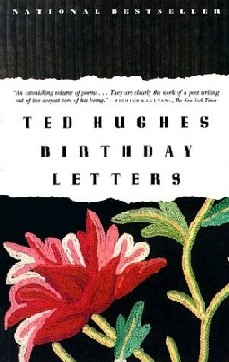I've been reading Ted Hughes' Birthday Letters. I picked it up idly last month, remembering that a long-ago friend had mentioned Hughes and wondering what reference I was supposed to take from that. (In this way I can continue a conversation for years after the other person has stopped talking.)

The book is a series of poems that Hughes wrote to Sylvia Plath, famous author and his wife, in the years after she killed herself, and they are lovely, mostly. Except each one takes a little piece of their lives together and crystallizes it and looks at it fondly from all angles and then ends in some variation of "that was a good day, and now you are dead." I haven't lost anyone close to me. Maybe this is how you react after a death -- specifically, a suicide -- re-examining every moment of what came before as you do after a breakup or betrayal. It gets exhausting. I have to read it in bits.
On top of this, I occasionally find his phrasing to be incomprehensible, which is probably because I managed to avoid taking any poetry courses in college except for the Romantics and never tackled Milton at all.
See, for example:
Stupid with confidence, in the playclothes
Of still growing, still reclining
In the cushioned palanquin,
The nursery care of nature's leisurely lift
Toward her fullness, we were careless
Of grave life, three of us, four, five, six --
Playing at friendship.
-Caryatids (2)
I get the gist, but the stuff at the beginning swamps me a little. But as I say, I am stupid about poetry.
Still, it holds my attention. I keep thinking "how nice to be immortalized by a Poet Laureate," forgetting that Plath immortalized herself. And perhaps I should be indignant on her behalf, that her estranged husband mined her madness and sadness to such good effect. But it seems to me that the personal stuff is irrelevant by now, and time has burned away their private betrayals from the art they left.
Which is not to say I will ever get over the shit that Abelard said to Heloise in their letters. Some guys you just can't forgive.